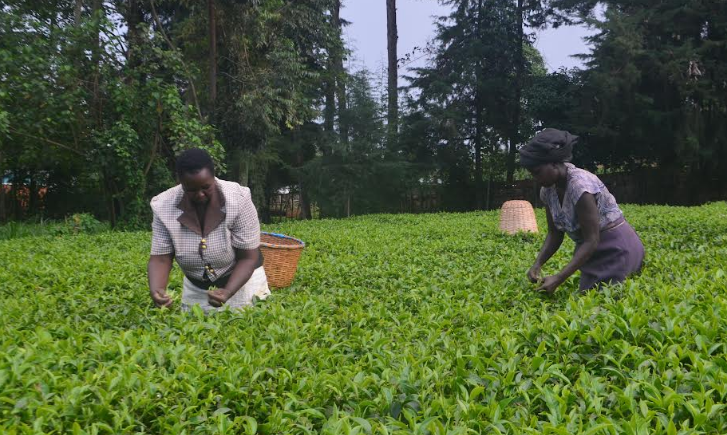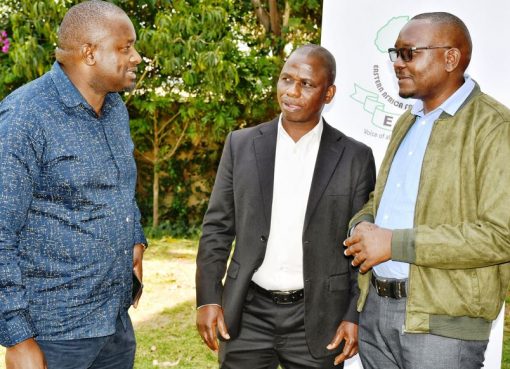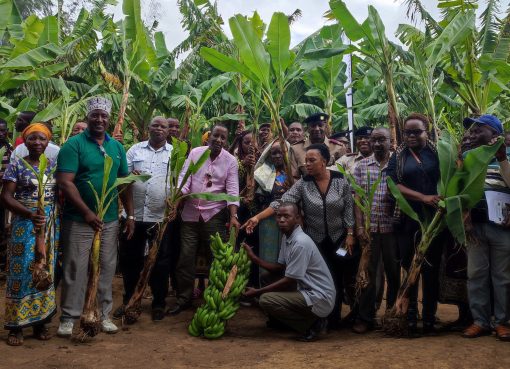The Tea Board of Kenya (TBK) has advised smallholder tea farmers in the West of the Rift Valley region to focus more on quality than quantity and to enjoy higher bonuses.
The Board, in collaboration with Kenya Agricultural and Livestock Research Organisation (KALRO), Tea Research Foundation of Kenya (TRFK), Kenya Tea Development Agency-Holdings Limited (KTDA), Independent Tea Procurers Association Kenya (ITPAK), and the East African Tea Trade Association (EATTA), is leading a farmer-centred sensitisation campaign to restore tea quality and improve tea farmers earnings in the West of Rift region.
The trainings targeting selected smallholder tea farmers from listed tea factories managed by KTDA in the West of Rift Valley region focus on farm management, pruning, fertilisation, plucking, tea handling, transportation, and pricing. They commenced on November 26 and will run until December 6th this year at Momul Tea Factory.
In an interview with KNA at Kiptome Tea buying centre, TBK Chief Executive Officer (CEO), Willy Mutai, revealed that the government was making deliberate efforts to ensure small-scale tea farmers are focused on leaf quality plucking for them to earn higher bonuses.
He added that the difference in bonus payments between regions is directly linked to the quality of tea harvested.
Momul Tea Factory, located in Belgut Sub-county, Kericho paid its farmers a Sh50.30 per kilogram bonus rate for the Financial Year 2023/2024, the highest in the West of the Rift Valley region, with the lowest ranged from Sh 20.00 as the least amount the farmers received from every kilogram of green leaf.
“This leaf quality campaign is a deliberate effort by the government to make sure that all farmers understand the tea business, where the farmer should know that quality is what drives the price. At the end of each day, the average price determines what the farmer will be paid. The price starts at the farm and ends at the tea auction. We have brought various farmers all the way from Nandi, Nakuru, Kakamega, Kisii, Nyamira Bomet, and Kericho to come and benchmark here at Momul Tea Factory. Momul Factory’s performance last year was very good. They earned a bonus of Sh 50.3 plus a monthly pay of Sh 24. The price difference is because of the quality of tea plucked. This is a factory that has really embraced harvesting of good quality leaf, and their performance is very encouraging,” said Mutai.
The CEO challenged farmers to adhere to the provisions of the green leaf agreement with their factories, entrench tea quality practices, and support competent leadership in their respective factories.
He hinted that Kenya was in the process of reclaiming the Iran Orthodox tea market and expanding its presence in the China market.
“The week of 8th to 13th December, I will be leading a delegation to Iran to make sure we unlock that market for Orthodox teas. This is really a market we embrace, and this is a market we are really pushing to make sure is still retained as a whole auction market for Orthodox Tea. We have a deliberate effort to expand in China. This is a new emerging market,” revealed CEO Mutai.
Orthodox tea is quickly emerging as a sought-after variety in the global tea market, as it is distinguished by its traditional production methods that uphold the integrity of the tea leaves, resulting in a sharp, distinguishable flavour profile.
In an interview with a smallholder tea farmer, Mzee Henry Too, he commended the Board for their campaign, adding that he was able to produce quality green leaf from his five acres of tea plantation as he keenly engaged teasers on his farm for advice on the best agronomical practices.
“I started tea farming in 1988, where I planted my first tea bushes, and the last tea bush that I planted was in 1994, and all the way in my tea journey as a smallholder tea farmer, I have been involving the teasers. One tea bush should give a farmer who goes for the best agricultural practices two kilograms per year. I have managed to educate my children as well as clear loans using the tea bonuses; I earn from the good quality that I deliver to Momul Tea Factory,” said Mzee Too.
Echoing similar sentiments, Momul Tea factory extension teaser, Mr. Eric Kosgey, appealed to farmers to engage in best agronomical tea practices for them to boost production of quality green leaf to earn better incomes from their cash crop.
“Last year we had 16,000 smallholder tea farmers delivering their tea to Momul, and currently we are having around 20,000. We are leading in the West of Rift region, and I appeal to the tea farmers to continue practicing best agronomical tea practices so as to improve the quality of their green leaf and boost their tea bonuses,” appealed Kosgey.
By Sarah Njagi




